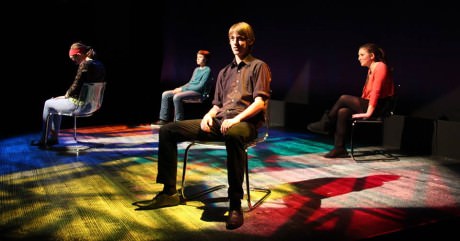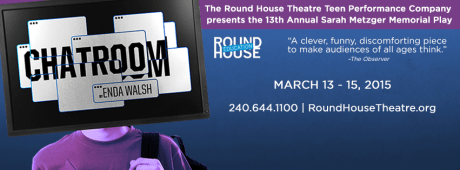Chatroom is playing this weekend at Round House Theatre and Willa Murphy talks about playing Emily.
Joel: Introduce yourself and tell us about your theatre appearances in the area and your training-theatre and vocal-you have had so far.

Willa: My name is Willa Murphy, and I’m playing Emily in this year’s Sarah Play performance. I’ve attended several Round House classes over the years and I costume designed for last year’s Sarah Play. I’ve also been part of high school productions and student-written short plays.
How long have you been a member of the Teen Performance Company and what valuable lessons have you learned so far? And how has the program made you a better actress?
I’ve been in the Teen Performance Company for two years now. I started my freshman year as a costume designer, and now I’m an actress. I’m so thankful for being able to look at the play from the position of a designer and then as an actress, because it gave me an appreciation of everyone’s role in contributing to the final product. This year, I’ve learned how to identify my strengths and weaknesses and ways to manage my stage freight and pre-show anxiety. I’ve also learned that listening is one of the most important things when you’re in a theater, both on an off stage.You have to be constantly aware of everything that is going on, or else you’ll end up hindering the process.
Why did you want to be a part of the cast of Chatroom?
I wanted to try to perform in my second year of Sarah Play, because acting has always been my first love in theater productions. I read the play a couple of months before auditions, and instantly gravitated towards its very powerful and poignant themes that stem from the characters’ internal and largely misunderstood struggles, a sentiment which I think a lot of teens can relate to.
Who do you play in the show and what do you like about your character and what do you not admire about her?
I play Emily in Chatroom, who is this wonderful character that balances between becoming a victim and standing up for the people she cares about. I love her enduring awkwardness, because I think I share that social ineptness with her to some degree. I love that she doesn’t really know these anonymous figures in an online chatroom, but she cares about them so intensely. Just as some characters in the show deal with their insecurities by projecting them onto others, I think there are some beautiful moments of the play where Emily takes all of the help and happiness that she wants to give herself and offers it to these strangers that she’s never met face-to-face. And this is also one of her flaws, because I want Emily to have more confidence just as I want myself to feel secure in myself. I think identifying so much with the character has made me feel a very raw connection with her, and I just wish that this character could realize the positive impact she makes through the play.
Have you or any of your friends been through any cyber experiences like the characters in the show go through?
I think one of the most prominent dangers of any internet conversation is interpretation. One person’s joke can easily be seen as a passive- aggressive dig at another person. I know several people who have fallen into the slippery slope of over analyzing what they hear and what they read because a lot of times, there’s not enough context to understand someone in face to face conversations, let alone in an anonymous setting.
What themes and lessons does Chatroom offer to young theatergoers?
I’ve interpreted Chatroom to be a story of endurance. Most teenagers have something about themselves that they don’t like or don’t want to show, and anonymity provides these characters with a resource to portray themselves in a new light. Some of the most troubled characters are very dismissive of their own problems or make things out to be easier than they are. I think the play teaches young theatregoers that nothing can be taken as face value, and that there is a person behind every comment and video call and message. On social media websites, I always see these seemingly amazing lives of parties and friendships, and that’s not all a person is. They are displaying the form of themselves that they most like, and teenagers shouldn’t judge their own characters by comparing them to the best image of another person.

What scene in the play is the hardest one for you to play and the hardest to watch and why?
One of the hardest scenes for me to play is the first one I’m in, where Emily has a conversation with Eva about everything from Britney Spears to belly buttons. The small lines where I have to show a clear intention with a few words or while having to be in my chair can be difficult, and the most anxious I am is at the top of the show, so during that scene I have to make myself focus on the character rather than my concerns about everything that could potentially go wrong. The hardest scene to watch is when another character, Jack, gets kicked out of a chatroom, and we see Jim slip into this passivity about what’s going on around him, and it seems like he’s turning himself into a cause he’s not invested in. It’s a quick, but very tragic moment of the play.
What character in the show is most like you and why?
I think I identify most as Emily, because I’ve found bits of pieces of myself in the things she says and does. I don’t have the same level of spontaneity but I see myself in her quirky, awkward lines and the way she tries to engage others.
What have you learned as an actor while preparing for this role?
I’ve learned through preparing for the role that there is always room for improvement. No one is a perfect human being, and no one is a perfect actor.
What was the best advice your director gave you about playing your role?
Our wonderful director aided me in presenting the character of Emily by asking me questions after I did a scene. It made me dive into my reasons for being in the online chatrooms, her methods of interacting with people, etc. She showed me that everything I do has to be a choice, and that made me think more about my choices, and what did or didn’t work, and choices I could make to improve my performance.
What do you want the audience to take with them after seeing Chatroom?
I want the audience to see the differences and similarities online world and real life. Through the amazing student filmmakers, we have a view into the offline life of the characters, particularly Jim’s reality. I’ve seen belittling of cyber bullying because people think it’s so easy to disconnect from a harmful environment if you can click the red exit button. But being surrounded by strangers online can lead to psychoanalytical behavior and feelings of isolation and hopelessness. I hope the audience begins to pick up on that after seeing the play.
Chatroom plays tonight at 8 PM, tomorrow, Saturday, March 14th at 3 and 8 PM and Sunday, March 15th at 3 PM at Round House Theatre-545 East-West Highway, in Bethesda, MD. For tickets, call the box office at (240) 644.1100, or purchase them online.





